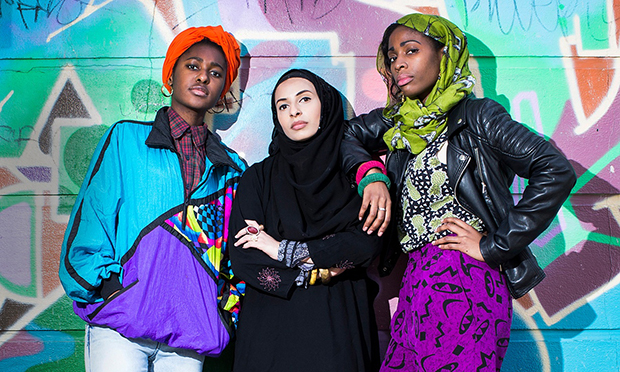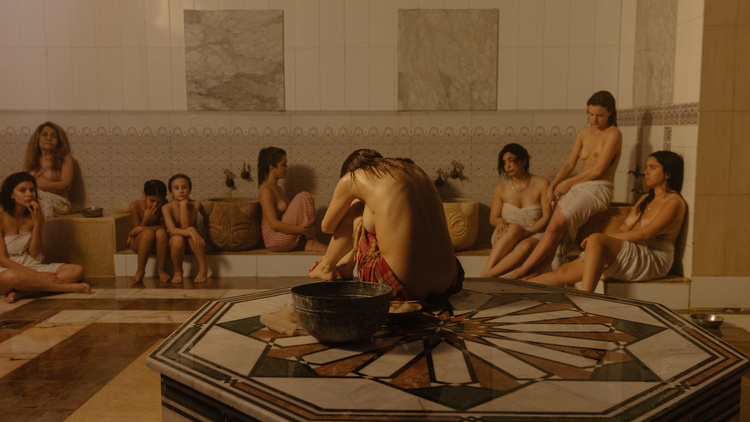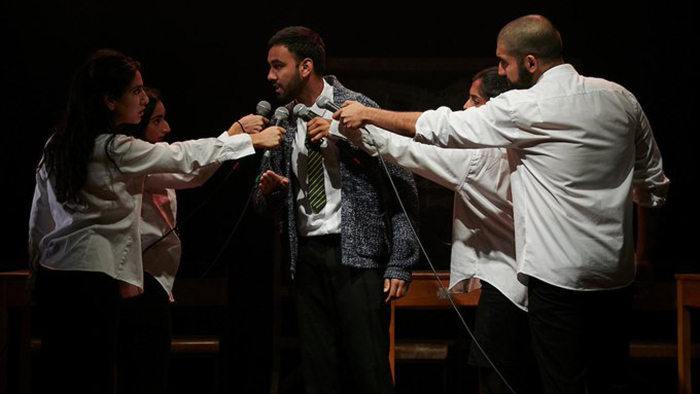[vc_row][vc_column][vc_column_text]

The 112 young cast members were two weeks into rehearsal when the production was cancelled. (Photo: Helen Maybanks / National Youth Theatre)
Name of Art Work: Homegrown
Artist/s: Nadia Latif director and Omar El-Khairy writer
Date: February – August 2015
Brief description of the play: Homegrown is a piece commissioned by the National Youth Theatre (NYT) investigating the motivation behind radicalisation of young Muslims in schools. Designed as an immersive promenade theatrical performance, it presented the stories behind the headlines and the perceptions and realities of Islam and Muslim communities in Britain today. The play was 70% was scripted; 30% was devised with the full cast of 112 young people aged between 15 and 25 during rehearsals in London in the weeks running up to the performance.
Commissioned by: National Youth Theatre (NYT) for the summer production of 2015. Paul Roseby talks about the commission to the media: “I think it is our duty as a young company to commission new work and tell stories that are on the edge that divide opinion. Perhaps the end result theatrically will also divide opinion – it was ever thus – but I think it is worth the risk because theatre is a very powerful medium to explore those issues that can make people feel uncomfortable.”
Venue: There were a number of issues securing a venue; a school in Bethnal Green pulled out after Tower Hamlets Council stated that “the school was not aware of the subject of the play when they agreed to lease the premises. Once they became aware, they decided that it would not be appropriate to rent their premises to the National Youth Theatre.” The NYT secured the UCL Academy in Camden, North London, instead. [/vc_column_text][vc_custom_heading text=”Why was it challenged?” font_container=”tag:h3|text_align:left” use_theme_fonts=”yes”][vc_column_text]The play was cancelled two weeks before it was due to open. The creative team – Latif and El-Khairy – received an email from Roseby on July 30th 2015, 10 days before the first previews were to take place, informing them that the show was to be cancelled. The reasons given were that NYT could not “be sufficiently sure in the remaining time available of meeting all of our aims to the standards we set and our members and audiences have come to expect”. They cited that this work involved artistic risk which brought with it a double responsibility “to the work, of course, but especially to safeguard our members”. The cancellation caused a furore in the press, and in spite of repeated requests for meetings to address their unanswered questions, no further meetings between the Latif, Omar and the theatre took place.
The cancellation came as a massive shock to the creative team and the participants, as Latif explains in one of many interviews with the media some weeks after the cancellation: “…we’re genuinely still reeling. The gesture of someone silencing you is a really profound one. You give your heart and soul to something, and someone comes and shuts it down. It’s like they’re saying my thoughts and feelings are no longer valid.” Beyond the shock of the cancellation, Latif also stressed that the cancellation “has massive emotional, political and social implications. It adds to this atmosphere of fear that we’re all living in.” This was cemented further by the lack of transparency, and unwillingness to meet, which led to Freedom of Information (FoI) requests being issued on behalf of the creative team.[/vc_column_text][vc_custom_heading text=”Freedom of Information revelations” font_container=”tag:h3|text_align:left” use_theme_fonts=”yes”][vc_column_text]Email exchanges between FYT and Arts Council England, made public through FoI requests, reveal more about Roseby’s reasons for cancelling. Five participants had dropped out and 2 parents expressed “grave concern” over the direction of piece was taking. He claimed that one parent’s concern “appears to represent the general temperature in the room”, though he admitted that they had not had time to confirm whether this was the case. But it contributed to the concerns being expressed by members of his team.
The tone of the work was, he claimed, problematic. In Roseby’s view it was “very one-dimensional” and lacked an “intelligent character arcs”. Rather than providing “balance or debate around extremism” the project seemed to be “exploring where to place the hatred and blame”. He felt that concerns about the content in combination with safeguarding issues represented too great a risk and claimed that the “creatives have failed to meet repeated requests for a complete chronological script to justify their extremist agenda”.
In the email Roseby, also states that they consulted with the Metropolitan Police had “rightly raised some concerns over the content with particular reference to any hate crimes and the ability for the National Youth Theatre to control all social media responses,” but stresses that the reasons for cancellation were taken internally. He ends the email with the following statement – “At the end of the day we are simply “pulling a show” and at a point that still saves us a lot of emotional, financial and critical fallout.”
In interviews with the media, Latif refutes the claims made by the theatre in the email to the Arts Council which she said contained lies: “We absolutely supplied them with a script. They signed off on it.” She was deeply concerned by being labelled an extremist. “It’s a really serious accusation to make in this day and age. It’s really troubling someone can use that language as a description of someone.”[/vc_column_text][vc_custom_heading text=”Statements” font_container=”tag:h3|text_align:left” use_theme_fonts=”yes”][vc_column_text]In the absence of a public or even private dialogue between the theatre and the creative team, a dialogue of sorts was carried out through statements issued by different stakeholders.
Creative team’s statement decried the cancellation of the play with “no warning and no consultation”. It included the voices of the actors; one described the experience of being silenced as like “my vocal chords being cut. It was everything that was needed to be said and everything that I always felt I couldn’t say.” Another actor spoke for many people who were shocked at NYT’s decision to cancel a play about radicalisation: “If you are going to take on a subject matter this sensitive then you have a responsibility to see it through.“
As Latif points out the political backdrop to the play, with Prevent Duty and Channel programmes in operation, has created the environment “in which certain forms of questioning, let alone subversion, of the given narrative pertaining to radicalisation or extremism can be closed down.” It was precisely in response to this environment that Homegrown was designed to throw some light on “the socio-political landscape of radicalisation, homegrown extremism, and even the simple conversation about Islam”.
It was this double irony that was so shocking to many and led to speculation that the theatre must have been put under considerable external pressure in order to cancel a play they had commissioned about radicalisation. But the theatre maintain emphatically that “no external parties had any involvement in the decision to cancel the public presentation of Homegrown”.
The Cast’s Statement, signed by 37 members, made clear that the rehearsals and devising process of the show, given the “delicate nature” of the topics under scrutiny, took place in an atmosphere of “trust and safety”, their ideas were respected and they were always given the choice to opt out if they felt uncomfortable with “certain aspects”. They also refuted the NYT’s claim that the team didn’t make the script available and specifically challenged Roseby’s concern about the absence of any “intelligent character arcs”. They asserted that “There is no overall intelligent arc on the issue of radicalisation. It is a difficult and multi-faceted discussion, which Homegrown looks to explore in as much of its entirety as possible”.
NYT’s statement reiterated their belief that the play failed to display the “editorial balance” required and referred to their safeguarding responsibilities:“The subject matter of this play, its immersive form and its staging in a school required us to go beyond even our usual stringent safeguarding procedures to ensure the security of the venue and safety of cast members”.
English Pen: in a letter to the NYT signed by artists and others and published by the Times there was a sense that something was being withheld by the theatre: “We are deeply concerned by reports that the NYT may have been put under external pressure to change the location and then cancel the production.” They also raised the wider implications of the cancellation for British theatre and freedom of expression more generally. “The play seeks to examine radicalisation and disaffection among British youth. Its cancellation serves only to shut down conversation on these important issues”. The letter goes on to stress the duty on all cultural stakeholders, the police, local authorities and arts organisations “to respect and protect freedom of expression — even, and most especially, where they disagree with the message or find it controversial.”[/vc_column_text][vc_custom_heading text=”Access to email correspondence” font_container=”tag:h3|text_align:left” use_theme_fonts=”yes”][vc_column_text]For the purposes of this case study, Latif gave Index on Censorship access to her correspondence with the theatre from the start of the commission. The impression from reading through the lengthy and often detailed exchanges was that whilst the NYT raised concerns along the lines made public, about the need for a compelling narrative arc or plot, with two specific concerns over “shocking” content, and made two requests for a full chronological script (on July 24th and again, more urgently on 30th – the morning of the day the show was pulled) Latif’s replies and reassurances were never challenged or found inadequate. At no point was there any indication that these concerns might be grave enough to pull the play. There was no suggestion that whilst carrying on open and constructive communication with Latif, the theatre was, as they revealed in their email to the Arts Council “consulting various organisations including the Met Police with regards to safeguarding” and, in a manner Roseby described as “very considered and caring”, carrying out an internal SWOT analysis on whether to cancel the play or not.
Ten days before the rehearsals were due to begin, and following a detailed, written discussion between Roseby and Latif about a whole range of staging, characterisation, stylistic and structural issues, all of which were satisfactorily resolved, Latif laid out her artistic vision for the piece: “Most of my references for this show are horror films of the 60s, 70s and 80s. That’s why the tour guides [leading the audience around the promenade performance] are less and less in control – by the end they and the audience should feel like they have no idea what’s going to be behind the next door (the images they encounter will get more and more violent).” In his reply, Roseby seemed quite satisfied and wished her luck with the rehearsals. [/vc_column_text][vc_custom_heading text=”What happened next?” font_container=”tag:h3|text_align:left” use_theme_fonts=”yes”][vc_column_text]Index on Censorship worked closely with Latif and El-Khairy after the cancellation, supporting their efforts to find a new venue to produce the play and a publisher to publish the script – see George Spender’s ‘reflection’ below. When neither of these efforts bore fruit, Index on Censorship produced the launch of their self-published script at the Conway Hall, in London. [/vc_column_text][vc_custom_heading text=”The Inconvenient Muslim” font_container=”tag:h3|text_align:left” use_theme_fonts=”yes”][vc_column_text]The title of the book launch ‘The Inconvenient Muslim’ was chosen because the creative team felt it described their position as artists. In an article published around the same time, Latif and El-Khairy portray the UK arts establishment “with its obsessive seeking of a universal position” as being more comfortable letting white artists handle the more nuanced representations of Muslim identity, while the only artists to Muslim artists who gained popularity were those whose job it was to help the British public “to tell the Good Muslim from the Bad”. Latif and El-Khairy claim that while comic Stewart Lee and director of Four Lions Chris Morris are granted the freedom to express the “anger and disdain that characterises their work, the same can rarely be said for progressive non-white artists.” They are Inconvenient Muslims because they are telling an inconvenient story that attempts to convey some of the reality that leads to young people being radicalised. The resulting piece was, as Roseby anticipated it would be when he discussed the commission in the first place, “uncomfortable”. It doesn’t make easy reading. “We’re trying to say these kids are becoming radicalised in a nation that’s rife with phobia – whether that’s homophobia, sexism or Islamophobia”. [/vc_column_text][vc_custom_heading text=”The launch event” font_container=”tag:h3|text_align:left” use_theme_fonts=”yes”][vc_single_image image=”106729″ img_size=”full” add_caption=”yes”][vc_column_text]The launch of the Homegrown script featured a panel discussion and extracts from the show by 44 members of the original cast who had stayed to finish the work with Latif and El-Khairy in their own time. Lyn Gardner came to the launch, read the play and reviewed both. She found the script “unwieldy and very different” from standard play texts, in large part because, she recognises, the performance was immersive and promenade in structure. She saw this as a positive attribute of the script, reflecting the “way we communicate in an age of social media, particularly if you are under 20.” It is what makes it “authentic, snapping and crackling with the sense of young people thinking out loud about who they are, freely voicing their experiences and perceptions of the world.” What she reads in the play resonates with what the young people reported about the devising process, that they had felt supported and safe to articulate difficult ideas. Gardner states that cancelling this play silenced the two groups who are rarely authentically and freely represented in theatre, namely Muslims and young people. “in sensitive and difficult times we need complex and challenging plays such as Homegrown.” The implications of this act of censorship are far-reaching: “If our theatre culture runs scared and bows to censorship, it is failing artists and audiences and in danger of making itself a complete irrelevance.”
Gardner advocated for the play to be staged. To date, the play has not been staged in full. [/vc_column_text][vc_custom_heading text=”Reflections” font_container=”tag:h3|text_align:left” use_theme_fonts=”yes”][vc_column_text]George Spender, Senior Editor, Oberon Books
In Summer 2015 Omar El-Khairy invited me to meet director Nadia Latif to discuss Homegrown their new National Youth Theatre commission. Oberon had published his first two plays and I was thrilled by their plans for this new show that wouldn’t just look at the Trojan Horse of Radical Islamism in schools, but also examine what it meant to be a Muslim in Britain in 2015. They cited the British-Sudanese novelist Jamal Mahjoub and Arun Kundnani’s The Muslims are Coming!: Islamaphobia, Extremism and the Domestic War on Terror as major influences on the tone of the work. When it became clear the script would not be ready to publish in time for the NYT run, we agreed to publish afterwards, incorporating notes to help teachers tackle the sensitive issues raised in the play.
The announcement that the show had been cancelled came as a huge shock. I didn’t think it was possible to label the Omar and Nadia I knew: bright, progressive, fun and liberal as having an extremist agenda. I wrote to them in support; it seemed more important than ever to publish the script. I presented Homegrown at an editorial meeting at Oberon, and we agreed to go ahead. I asked Omar, Nadia and David Heinemann (Index on Censorship) to come into the Oberon offices in early May 2016 to discuss marketing strategies and other plans.
Frankly, the meeting didn’t go at all well. There were too many very ambitious plans, conflicting opinions, plus the fear of a public backlash over publishing what had been labelled as extremist material (in my opinion a frustrating misunderstanding), all leading to a loss of faith among the senior management. I was asked to withdraw our involvement.
It was devastating to break the news to Omar and Nadia, given the ill treatment and accusations they had suffered with great dignity. I wrote to them pledging my continued assistance if they would have me. We discussed other potential publishers – Faber declined, Verso said they didn’t do Drama, Aurora Metro seemed keen but they demanded changes which didn’t sit well with the authors. Rather than face more rejections, we decided to do it ourselves.
I edited the text, and another Oberon colleague and Homegrown supporter, James Illman, donated his time typesetting and designing the cover. We used aliases, Kim Slim and Mr Sickman; we weren’t sure what media reaction the book would get, and thought it best to mask our involvement so as not to complicate matters. If I could do it again, I’d use my real name.
The book launch in March 2017 organised by Index was a cathartic experience. It meant the world to hear the words spoken, and have a positive conversation about the play. I hope what Omar and Nadia went through lays the foundations for other BAME artists to be able to make fiery, political, avant garde work without self-censorship, or unfounded hysterical accusations of extremism, that we can debate and give artists room to fail, rather than shut down these conversations entirely.
Shakeel Haakim – NYT performer
I was new to the world of acting, to describing myself as an actor, navigating it all, I was 19 at the time. I thought, this is going to be an amazing opportunity and I was looking forward to it. I had joined NYT the previous year, done my in-take course and done a couple of little shows, including a fundraiser with some notable celebrities which validated how well connected and established NYT was. I had that sense of security, it was all so reputable – I felt protected and part of something solid. It was that security that made it so much more shocking for some of us – we all had faith. When we wrote the letter we were clear that there is nothing can take away from the good things that NYT does, the opportunities that they give through connecting people – which is what made it even more of a thing.
It came across that we [the cast] were worried that it would be too controversial, but a lot of us didn’t feel that. I remember the day before we were told it was cancelled, we had this joke – what would happen if this was to be cancelled, but the joke was only funny because we were so sure that it couldn’t be. It was a very collaborative process, we devised the work. It was coming from us – it had been so collaborative for so long and then to be told it was cancelled, initially it was a massive shock. You get half way into production and the rug gets pulled from under your feet. You have been making choices all the time, and you feel that you should have had some sort of say in that – you want to be able to say I don’t want to stop here. These weren’t our decisions to make; and after being in such a collaborative process, that was hard to understand at first.”
I didn’t realise how much it had affected me. I had a part-time job at the same time, and I stopped acting for a year. It threw me off, it was so intense – six weeks, every day with 100 people. After it ended, it was a culture shock. My part-time job became full time. Slowly bit by bit, I discovered my love and my passion coming back and did a couple of things and worked with the lyric for 9 months in their young company and we did a two week show and I got approached by an agent which I later signed with”.
I believe everything is a blessing in disguise. The whole process made me realise that as much as we think we live in a society where free speech is the norm, there are people higher up who ultimately have the last say.
Douglas Wood – NYT performer
Whenever you pull a show it is never a good thing, and one of the problems was how it was dealt with. I wish there had been a little more information made public. Because information or at least potential reasons were passed to us, at least individually, information was passed to us whether it was satisfactory or not at least there was more clarification, but wasn’t made public. But then, how helpful is it to the (NYT) to focus on a show that they failed, as opposed to the other good that they do, and also how helpful is it to the ongoing potential of Homegrown happening and being focused on Islamaphobia and radicalization rather than censorship and “the show that got pulled.”
NYT tackles difficult stuff but their primary focus is engaging young people, in my experience and what I think is really exciting and important, is the number of people they engage and the total range. Maybe because Homegrown was a bit of a disaster, instead of having one huge show in London, they have done lots of smaller shows with new writing and new commissions. There is a lot going on in Birmingham, Sheffield and Liverpool and they are engaging people all over the country, instead of just London which was a bit of a problem in the past.
What makes it difficult to take is that kind of play (Homegrown) hadn’t been done before. The amazing thing was the way Omar and Nadia were approaching it, giving all these 130 young people a voice on a issue that wasn’t really being voiced in mainstream media or anywhere else. The fact that the one show of its kind (at least at the time) got cancelled. If there were loads of plays about why young British Muslims become radicalized, or don’t feel part of where they are, it wouldn’t be that big an issue.
It felt so much more damning, and close to censorship, because there was no evidence of plays like it. When it was pulled there was nowhere else you could go to get this information, at least in theatre.
Paul Roseby declined Index on Censorship’s invitations to provide his reflections on the controversy after the events of Summer 2015.
Islamophobia
Representation is a conversation we are seldom
invited to
from Sisters’ Entrance by Emtithal Mahmoud[/vc_column_text][vc_single_image image=”106716″ img_size=”full”][three_column_post title=”Case studies” full_width_heading=”true” category_id=”15471″][/vc_column][/vc_row]





